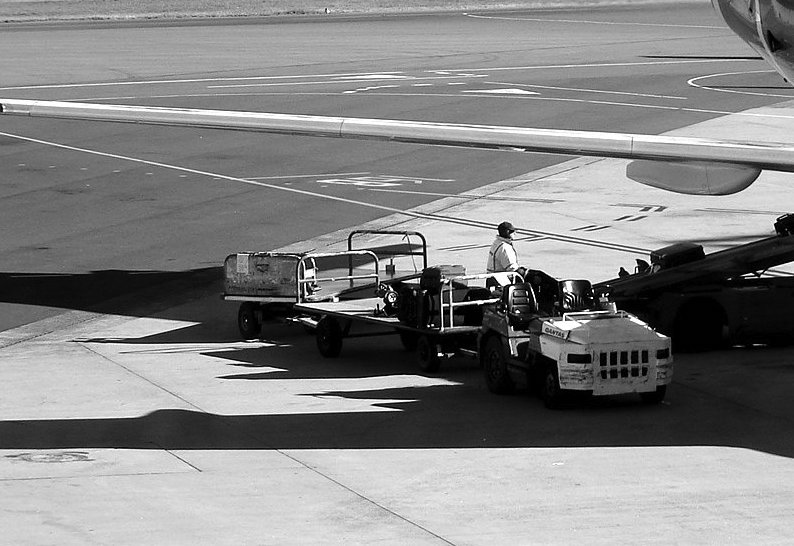An ongoing strike at Toronto’s Pearson International Airport has revealed the harsh working conditions of the airport’s baggage handlers and grounds crew.
Approximately 700 Swissport employees walked off the job on July 28, after rejecting the company’s latest offer. The vote to strike was overwhelming — 95 per cent.
These workers include those who load and unload baggage, make sure a plane’s weight is balanced, clean and tow planes and assist passengers with mobility needs. More than 40 airlines operating out of Canada’s busiest airport use Swissport. This includes commercial airlines like Air Transat, Sunwing, British Airways and KLM Royal Dutch, and cargo carriers like UPS.
The company is using temporary workers to replace striking employees.
Picket lines have been set up outside of the airport’s Terminal 3 and the Vista Cargo terminal. Trucks delivering cargo to Vista Cargo have faced delays of up to three hours.
Workers want fair wages and benefits and some control of their schedules.
There’s a lot of turnover in the job, partly because of low wages. That was something the company said it wanted to address, said Harjinder Badial, vice-president of Teamsters Local 419, the union representing the workers. But Swissport’s offer — raising wages to $14 an hour, which could be Ontario’s new minimum wage come January — wasn’t enough to fix this problem.
“It’s not a minimum-wage job,” said John Giannone, the local chief steward. Airport grounds crew work outside in extreme weather, carrying heavy bags for hours. They load baggage from their knees, or hunched over in the bottom of a plane. Repetitive stress, causing back and knee pain, become a regular part of the job. Unlike some jobs in the aviation industry, like flight attendants, grounds crew workers don’t get perks like discounts on flights, Giannone said.
When passengers come to the terminal, it “looks splendid up top,” said Levi Davis, a Swissport baggage handler for 10 years. “But there’s an underbelly where everything goes on.”
Baggage carriers have a painstaking, sometimes dangerous, job, he said. They constantly have to judge how to lift each bag without injuring themselves, especially because not all overweight baggage is properly labelled.
But the union isn’t just concerned about the workers holding signs and stopping vehicles. They’re also concerned about the temporary workers who have been brought in to replace them.
“Everything is calculated,” Badial said. Crew need to know how to correctly read load sheets and floor plans so the plane is balanced properly. If the plane’s centre of gravity isn’t right, everyone’s safety is at risk. The plane could fail during takeoff and crash.
Badial said he’s seen people who normally work in offices working on airplane ramps. He and other striking employees say these replacement workers are not getting enough preparation, some only receiving a few days of training.
“We’re hoping everybody’s safe on the inside,” Giannone said from the picket line at Vista Cargo. “But you can’t walk around a big aircraft not being aware of everything.”
The union has received photos of luggage strewn across floors, and heard stories of bags being placed on wrong planes, said Badial. Some flights have been delayed.
Swissport maintains the strike is not interfering with flights and that replacement workers have been properly trained. In an email to rabble.ca, Pierre Payette, Swissport’s vice-president of operations in Toronto, said the company’s “management team is actively engaged in the safety and job specific training that is mandatory for anyone working for or on behalf of the company. Certified staff as well as airline specialists are performing specific roles that require specialized training and certification by the airlines and the regulators.”
Further clarification was not given.
In the same statement, Payette called delays that occurred shortly after the strike began “an initial hiccup” and said any delays since then have been within the range of what would be expected during a strike.
But the union was concerned about the company using temporary workers before the strike.
In May, the union filed a complaint of unfair labour practices with the labour board about the company hiring temporary workers. According to the complaint, the company said it needed to do this because there weren’t enough workers. In a May 2 letter sent to union members, Local 419 representatives said they’ve been working with the company to resolve this issue for years.
The union also wants workers to receive more respect at work. Some are not getting meal breaks until the end of their shifts, or, in some cases, not at all.
“Respect is gone,” said Badial, who has been involved with the union for a decade.
Work schedules are unpredictable. Right now, the company needs to give employees 96 hours’ notice before they change their schedule, said Badial. But now it says it wants total control for schedules.
Flight schedules “change all the time,” he said, noting that’s a reality of the aviation industry, “but we certainly don’t want to give up that much control to (the company).”
Employees don’t always receive consistent amounts of work, and if they don’t work enough hours, they may not qualify for company benefits.
Meagan Gillmore is rabble.ca‘s labour reporter.
Photo: Alexander Else/flickr




